Karna in Mahabharata, Father, Mother, Wife, Death, Story
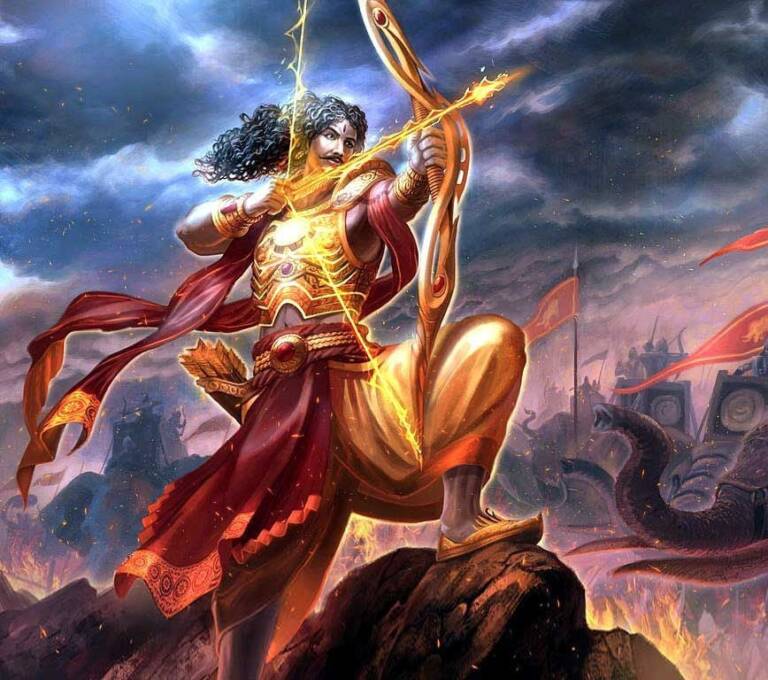
Who is Karna in Mahabharata?
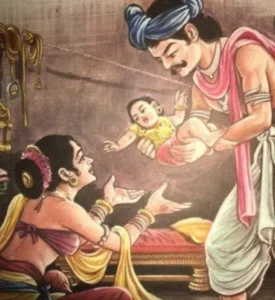
Karna is one of the most enigmatic and complex characters in the Mahabharata, and his life is filled with intriguing aspects that make him a figure of both admiration and tragedy. He is also known as Vasusena, Anga-raja, and Radheya. Raised by a charioteer, he is known for his exceptional skills in warfare. Despite his royal lineage, he remains loyal to Duryodhana, the eldest of the Kauravas, and fights on their side in the great Kurukshetra War.
Karna Father
Karna father was Surya, the Sun God. Surya Deva is seen as the source of all life and energy. He rides across the sky in a chariot pulled by seven horses, bringing light and warmth to the world. People often pray to him for health and vitality, as he is considered a symbol of strength and endurance. Surya Deva blessed Karna with his radiant qualities who is protected by kavach and kundla by birth.
Karna Mother Name
Karna’s birth mother was Kunti. She received a special blessing from the sage Durvasa. This blessing allowed her to call upon any god and have a child with them. Out of curiosity, Kunti decided to test this blessing and summoned Surya, the sun god. Surya appeared, and that’s how Karna was born to Kunti. Since Kunti was unmarried at the time, she felt embarrassed about having a child and decided to abandon Karna. But he was then adopted and lovingly raised by Radha, who became his foster mother. So, in a way, Karna had two mothers: Kunti, who gave birth to him, and Radha, who raised him.
Karna Wife
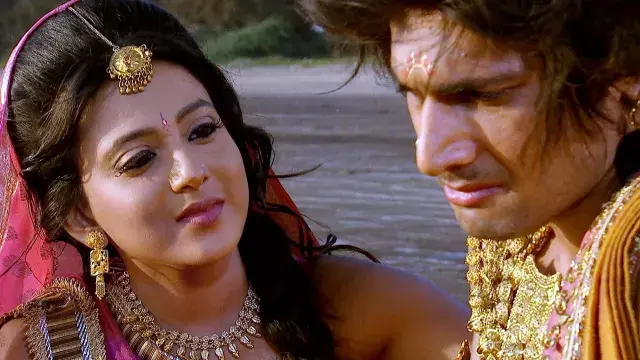
Karna’s wives vary in different interpretations of the Mahabharata. In some versions, Ponnuruvi or Padmavati are depicted as his wives. However, in many modern adaptations, Karna is portrayed as married to two women—Vrushali and Supriya. Despite Karna’s low birth, Vrushali marries him and stands by his side throughout his trials and tribulations. Their relationship is portrayed with deep affection and mutual respect in various retellings of the epic.
Karna Sons
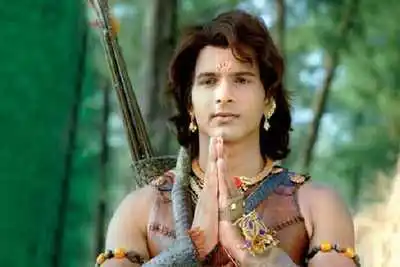
Karna’s sons were Vrishasena, Vrishaketu, and Banasena. Vrishaketu, the youngest son of Karna and Vrishali, becomes significant following the Kurukshetra War. Arjuna takes him under his wing, training him in warfare. Eventually, Arjuna appoints Vrishaketu as the king of Anga, thus honoring his father’s legacy and ensuring his position in the post-war era.
Karna Story
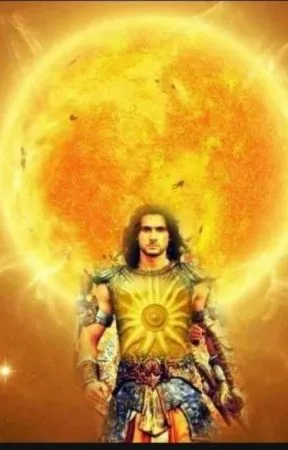
1. Birth and Early Life:
Karna was born to Kunti, the mother of the Pandavas, and the Sun God, Surya. His birth was shrouded in secrecy, as Kunti abandoned him out of shame. He was adopted by charioteer Adhiratha and his wife Radha, who raised him as their own.
2. Name and Identity:
Karna’s birth name was Vasusena, but he was later named Karna, meaning ‘ear,’ as he was discovered with divine earrings that made him virtually invulnerable. He grew up as a talented warrior, learning martial arts and archery.
3. Friendship with Duryodhana:
Karna’s life took a decisive turn when he formed a deep bond of friendship with Duryodhana, the Kaurava prince. Duryodhana’s unwavering support and recognition of Karna’s abilities fueled his loyalty to the Kaurava camp.
4. Struggle for Recognition:
Despite being a formidable warrior, Karna faced discrimination and humiliation due to his low birth. He yearned for recognition, respect, and the opportunity to prove himself.
7. Charioteer’s Wrath:
During the Kurukshetra War, Karna faced the anger of his charioteer, Lord Krishna. Krishna reminded him of his true lineage and urged him to abandon Duryodhana and join the Pandavas. Karna, bound by his loyalty and promises, remained steadfast in his alliance.
5. Generosity and Oath of Friendship:
Karna was known for his generosity. His famed ‘Daanveer Karna‘ title stemmed from his willingness to give away anything he possessed. His unwavering oath of friendship to Duryodhana led him to support the Kauravas, even when he knew it meant opposing his own brothers, the Pandavas.
8. Legacy:
Karna’s character is celebrated for his unwavering loyalty, generosity. He is admired for his resilience in the face of adversity and his adherence to principles, even when it meant sacrificing his own interests.
6. Unbreakable Promises:
Karna’s life was marked by a series of promises he made and refused to break, even when they were against his own interests. These promises included granting protection to the Pandavas’ mother, Kunti, and sparing their lives during the Kurukshetra War.
Karna Death
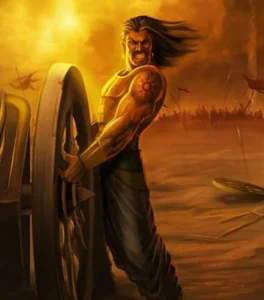
Karna met his demise during the great Kurukshetra War in the Mahabharata. In the epic battle, he faced his half-brother Arjuna, the greatest warrior among the Pandavas. Karna’s chariot wheel got stuck in the ground, leaving him vulnerable. Taking advantage of this moment, Arjuna, at the behest of Lord Krishna, launched a decisive attack, ultimately killing Karna with an arrow, thus ending his life on the battlefield.
Karna’s story in the Mahabharata is a tale of inner conflict, unwavering loyalty, and the complexities of identity and destiny. His life is a reminder of the profound themes that run through this epic, making him one of its most captivating and mysterious figures. All the scenes are shown in detail in a famous serial on star plus “MAHABHARATA” in which the real name of the actor who played the role of Karna is Aham Sharma.
Karna in Mahabharata FAQs
Is Karna Immortal?
Yes, Karna was actually born Immortal with a special blessing from his father, Lord Surya. He had these incredible earrings and armor (Kavach and Kundal) that were attached to his body, making him virtually invincible. But before the great battle of Mahabharata, he gave them away, which made him mortal.
Who Raised Karna?
Karna was raised & adopted by his foster parents, Radha and Adhiratha Nandana. They were charioteers and poets who worked for King Dhritarashtra.
Is Karna Kaurava?
No, Karna is not a Kaurava. While he was a close friend and ally of Duryodhana, the leader of the Kauravas, Karna himself was not part of the Kaurava family.
He fought in the Mahabharata war on the side of the Kauravas, showing his true friendship with Duryodhana. But, he was actually the son of Kunti and the Sun God, Surya.
